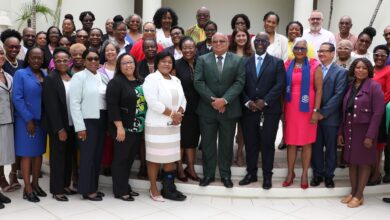(CARICOM Secretariat, Turkeyen, Greater Georgetown, Guyana) It gives me great pleasure to welcome you to this Thirty-Seventh Special Meeting of the Council for Trade and Economic Development (COTED) on the Environment and Sustainable Development.
Our new Secretary- General, Ambassador Irwin LaRocque, regrets not being present for this important meeting and sends his best wishes for a successful meeting. He was invited to attend the investiture of the new Chief Justice of the Caribbean Court of Justice in St Kitts and Nevis.
This Special Meeting of the COTED is particularly timely. The Community needs to prepare itself to effectively protect and advance its interests at a number of upcoming international conferences that are of critical importance to its sustainable development, namely: the Tenth Conference of the Parties of United Nations Convention to Combat Desertification scheduled for the Republic of South Korea on 10 -21 October, 2011; the United Nations Durban Climate Change Conference which will take place in South Africa on 28 November – 9 December, 2011; and the United Nations Conference on Sustainable Development scheduled for Brazil in June of next year.
It is anticipated that following this Special Meeting of the COTED, the leadership of the Community will be better prepared for the abovementioned United Nations Conferences. Priorities will have been highlighted. Opportunities and challenges will have been identified. The necessary guidance on the Region’s approach to and strategies for these conferences will have been secured. In order to attain these objectives, the agenda of this meeting addresses the issues relating to sustainable land management, urban development, climate change, ocean governance, and preparations for Rio +20, among other issues.
The 1992 Rio Declaration on Environment and Development states that human beings are at the centre of concerns for sustainable development. As the international community prepares for Rio+20, the notion of a “green economy” has become central. This notion provides both fresh impetus as well as an overarching framework capable of transforming the global economy into a more productive, truly sustainable and socially responsible global system, one which would give due consideration to the issues of development and equity.
It is well known that the Small Island Developing States in the Caribbean are a special case from the point of view of both the environment and development as outlined in the 1992 Rio Declaration. The Small States of the Caribbean and, more generally, Small Developing States continue to take the lead on the implementation of plans and programme to facilitate sustainable development. However, they are increasingly constrained by the interplay of adverse factors clearly underlined in Agenda 21, the Barbados Programme of Action and the Mauritius Strategy of Implementation for Small Island Developing States.
The convening of the United Nations conferences coincides with a period of deep concern and great uncertainty in the international community. This disquiet is the result of the global financial and economic crisis exacerbated by increasing debt worries in both developed and developing countries, and for our small states, unchecked climate change arising from the increasing levels of greenhouse gas emissions and the concomitant rises in temperatures and sea levels, and the emerging problems associated with escalating food prices across the globe.
The environmental resource base will play a very important role in helping to resolve these problems. This is a strategic task if the international community wishes to succeed in addressing the challenges of development in order to eradicate the high levels of poverty that exist in the world today.
In the Caribbean Community, the lessons of experience indicate that sustained levels of economic growth generating employment and incomes are a strategic imperative for our Member States in order to reduce the levels of poverty present in the region. In this regard, the private sector must play a major role as the engine for growth and sustainable development that can lead to the reduction of poverty and assist in providing resources for the transition to a green economy.
Agenda 21, the Rio Declaration of 1992 along with the 1994 Barbados Programme of Action and the 2005 Mauritius Strategy of Implementation have served as important instruments for orienting development policy in the Caribbean region towards the achievement of a number of specific goals and targets. The effective integration of sustainable development goals into the national planning framework is seen as an essential precondition for the successful implementation of Agenda 21. CARICOM Member States, through a number of sectoral polices, programmes and projects, have been forging efforts to meet the challenges of development. For example, the Government of Guyana is implementing its Low Carbon Development Strategy. The Government of Barbados has taken a number of significant steps with regard to the design and implementation of its green economy strategy. Similarly, the Government of Dominica is making efforts to complete the design of its organic development strategy. Meanwhile, Belize, Jamaica, St Kitts and Nevis, St Vincent and the Grenadines, St Lucia, Trinidad and Tobago and Suriname have all been implementing major projects that can transform their economic, social and environmental landscape.
Mr. Chairman, Our challenge at this meeting is not to tinker with demonstration projects but to focus on the strategic development interests of the Community. Sustainable development is quintessentially a cross-cutting issue that necessitates a high degree of policy coordination at all levels of government and of our region. The Caribbean Community has demonstrated on many occasions, particularly through functional cooperation and the other instruments of regional integration, that as small developing states, we can advance the region’s development efforts.
Honourable Prime Minister, Ministers, distinguished delegates, members of the media, in closing, please let me once again welcome you to this Special COTED Meeting on the Environment and Sustainable Development and wish you every success in your deliberations.





